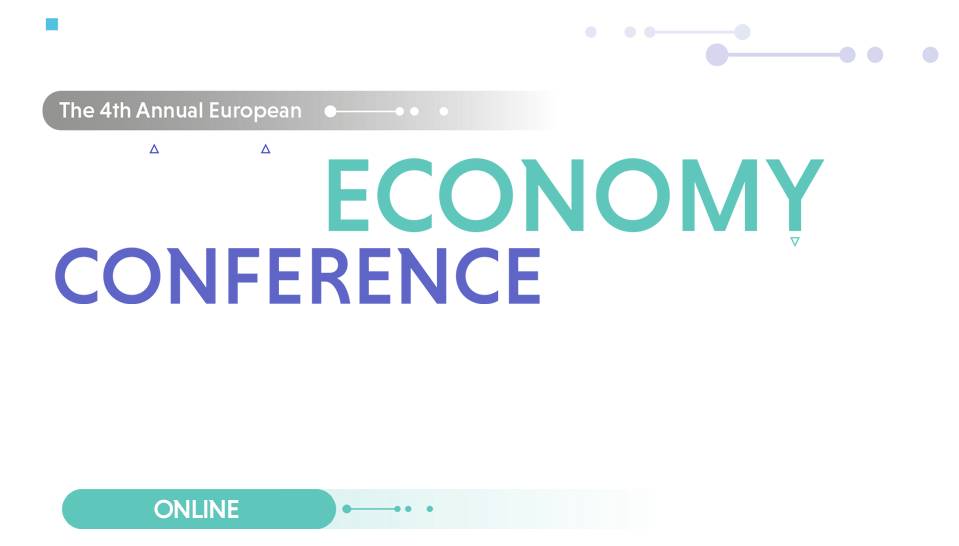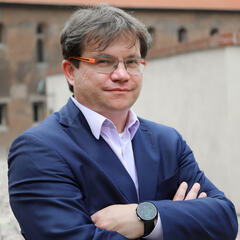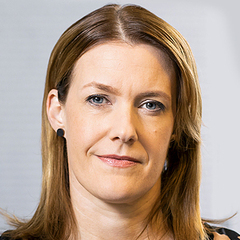
The 4th Annual European Data Economy Conference took place ONLINE on 9 November 2022 and gathered policymakers, industry players, national authorities representatives as well as civil society experts to discuss the extent to which The Data Act, The Data Governance Act & rules to create Common Data Spaces, can support the development of innovative business services and solutions to address the underutilisation of data at EU level.
Highlighting the possibilities and the existing constraints of data sharing, speakers discussed what more is needed at both regulatory and practical levels to meet the data governance and sovereignty requirements necessary to stimulate a thriving, fair and competitive single market for data that is developed with European values at its heart, while supporting the digital transformation of Europe in line with the 2030 Digital Decade ambitions.

 Petr Očko, Deputy Minister for Industry, Ministry for Industry and Trade, Czech Republic
Petr Očko, Deputy Minister for Industry, Ministry for Industry and Trade, Czech Republic Deputy Minister for new technologies at Ministry of Industry and Trade, Czech Republic
Mr. Petr Očko (born 1976) graduated from Information Management and European Integration at the University of Economics in Prague and from Ph.D. studies of Information Economics at the Faculty of Arts of Charles University in Prague. He started in 1998 in a small company that would now be labelled as a successful technology start up – the Globe Internet. As an expert in the European economic integration, he has been working at the Ministry of Finance since 2001 on the EU Structural Funds, since 2004 he worked as an advisor to the Deputy Minister of Finance for the financial market, and in 2006 he was appointed by the Government as a National Coordinator for the introduction of the euro. Since August 2007, he worked in the private sphere as an EU project coordinator for Telefónica O2. In 2009, he returned to the state administration as Chief Executive Officer for EU Budget and EU Funds at the Ministry of Transport, and since August 2010 he served as Section Director for EU Funds, Research and Development at the Ministry of Industry and Trade, where he was in charge for key programs to support industrial research and development, innovation and entrepreneurship.
In 2012-2013 he was also in charge of the stabilization and development of the CzechInvest business and investment support agency as its entrusted CEO. Since 2015, he headed the Department of Financial Instruments and Project Management at the Ministry of Industry and Trade and prepared mainly the National Innovation Fund project or the transformation of the Czech-Moravian Guarantee and Development Bank. In March 2016, he was appointed by the Government as chairman of the Czech Republic’s Technology Agency and successfully helped to develop support for applied research in key areas of the Czech Republic, including industry 4.0 and other major trends. In July 2018 he was appointed Deputy Minister at the Ministry of the Industry and Trade responsible for new division of Digitalization and Innovation and believes that Czech Republic can belong to innovation leaders in many areas.
Petr Očko
Deputy Minister for Industry
Ministry for Industry and Trade
Czech Republic

 Pilar del Castillo Vera, MEP, Rapporteur for the Data Act, European Parliament
Pilar del Castillo Vera, MEP, Rapporteur for the Data Act, European Parliament Pilar del Castillo Vera
Member of the European Parliament
Pilar del Castillo Vera is an MEP for Spain’s Partido Popular party in the European People’s Party group. She has been an MEP since 2004 and is currently a member of the committee on industry, research and energy (ITRE). Castillo drafted the report on the European single market for electronic communications. She also drafted a report on cloud computing in Europe. Before entering the European Parliament, she was the minister of education, culture and sport in the second government of José Maria Aznar in 2000-04. In 1986, Castillo became assistant professor in constitutional law at Universidad Nacional de Educación a Distancia, and professor in political science and administration in 1994. She graduated in law in 1974 from Complutense University of Madrid (1983) and she holds a PhD from the same University.
Pilar del Castillo Vera
Member of Parliament
Rapporteur for the Data Act
European Parliament

 Pierre Chastanet, Head of Unit, Cloud & Software, DG CONNECT, European Commission
Pierre Chastanet, Head of Unit, Cloud & Software, DG CONNECT, European Commission Pierre is Head of Unit Cloud & Software at the European Commission and is notably in charge of the European regulation on the free flow of non-personal data and the implementation of cloud policies. He has been working for 12 years at the European Commission in various management and policy development assignments, in the area of cybersecurity, digital privacy, ICT for societal challenges, green ICT and telecom innovation.
Prior to that, Pierre acquired over 10 years of ICT experience, mostly in various IT management positions at Procter & Gamble. Pierre holds a M.S. in Telecommunication Engineering from Telecom ParisTech, a M.A. in International Politics from the Free University of Brussels and a B.Sc in Economics from the London School of Economics and Political Science.
Pierre Chastanet
Head of Unit
Cloud & Software
DG CONNECT
European Commission

 Laura Eiro, Director General Data Department, Ministry of Transport and Communications, Finland
Laura Eiro, Director General Data Department, Ministry of Transport and Communications, Finland Laura Eiro is Director General of the Data Department at the Ministry of Transport and Communications of Finland. The Department is responsible for promoting the data economy and the availability of data, and for legislation and strategy work concerning information security in communications networks and services. Eiro serves as Secretary General of the Ministerial Working Group on Developing the Digital Transformation, the Data Economy and Public Administration as well as one of the Chairs of the interministerial Digital Office.
Previously Eiro has worked at the Ministry of Transport and Communications in expert and managerial positions. She has also worked at Finland’s Permanent Representation to the EU, at Intelligent Transportation Society of Finland and at the Ministry of Finance as Secretary General of the Finnish Technology Advisory Board.
Laura Eiro
Director General
Data Department
Ministry of Transport and Communications
Finland

 Federico Milani, Deputy Head of Unit, Data Policy and Innovation, DG CONNECT, European Commission
Federico Milani, Deputy Head of Unit, Data Policy and Innovation, DG CONNECT, European Commission Bio coming soon
Federico Milani
Deputy Head of Unit
Data Policy and Innovation
DG CONNECT
European Commission

 Miapetra Kumpula-Natri, Member, European Parliament
Miapetra Kumpula-Natri, Member, European Parliament Ms Kumpula-Natri is a Member of the European Parliament representing Finland and the S&D. She is a member of the Committee on Industry, Research and Energy (ITRE) and a substitute member to the Committee on International Trade (INTA), where she is the standing rapporteur of the parliamentary monitoring group WTO rules on e-commerce. Ms Kumpula-Natri is also the first vice-chair of the European Parliament’s Delegation for relations with the United States of America (D-US) and has served as the first vice-chair of the Special Committee on Artificial Intelligence in a Digital Age (AIDA).
A strong advocate for gender equality and women in tech and digital cooperation, Ms Kumpula-Natri is the chair and founder of the UN Generation Equality Friendship Group in the European Parliament and a member of the European Parliament´s delegation to the Conference on the Future of Europe. Previously, Ms Kumpula-Natri was a member of the Finnish Parliament for 11 years and chaired the Grand Committee responsible for EU-Finland relations at the parliamentary level. She has also been a member of her hometown local council in Vaasa for 20 years.
Miapetra Kumpula-Natri
Member
European Parliament

 David Vanozzi, CEO, CINECA
David Vanozzi, CEO, CINECA Born in Florence in 1968, David Vannozzi is the CEO of the Italian national supercomputing Interuniversity Consortium CINECA. Over the years, after several managerial experiences at Deloitte Consulting and Arthur Andersen, he has been appointed General Manager at the Industrial Association of Brescia and at the Sant’Anna School of Advanced Studies of Pisa, as well as Administrative Director at Health Authority of Florence. Moreover, he took on different roles in public and private companies as Board of Auditors, member of the Board of Directors and member of the Board of Evaluation.
After having obtained a Bachelor’s Degree in Economics and Business at the University of Florence with a dissertation in General and Applied Accounting, he attended several high-level training courses of Top Management, in Italy and abroad. He has been short-term lecturer of Statistics and Business Management. He is also author of several different articles published in Italian newspapers and specialised magazines, especially in business management, management of change and project management.
Over the years, he gained several experiences in project management, management of change, business process reengineering, lean management & six sigma. Working in the public sector for over 10 years, he has developed a specific competence in managing the relations with the local bodies and central institutions (Ministries) and with the press.
David Vanozzi
CEO
CINECA

 Thomas Boué, Director General, Policy — EMEA, BSA | The Software Alliance
Thomas Boué, Director General, Policy — EMEA, BSA | The Software Alliance Thomas Boué oversees the BSA | The Software Alliance’s public policy activities in the Europe, Middle East and Africa region. He advises BSA members on public policy and legal developments and advocates the views of the ICT sector with both European and national policy makers. He leads on security and privacy issues as well as broader efforts to improve levels of intellectual property protection and to promote open markets, fair competition, and technology innovation in new areas such as cloud computing.
Prior to joining BSA, Boué served as a consultant in Weber Shandwick where he advised clients on a wide range of technology and ICT-related policy issues and represented them before the EU institutions and industry coalitions. In this role, he also served as policy and regulatory adviser for both EU and US telecom operators. Prior to that Boué worked for the EU office of the Paris Chamber of Commerce and Industry where he was responsible for the lobbying activities towards the EU Institutions in the areas of trade, education, and labor, as well as for the organization and running of seminars on EU affairs for SMEs and business professionals.
Boué holds a Master of Business Administration from the Europa-Insitut (Saarbrücken, Germany), a Certificate of Integrated Legal Studies (trilateral and trilingual Master’s degree in French, English, German and European Law, from the Universities of Warwick (UK), Saarland (Germany) and Lille II (France) as well as a Bachelor of Arts in Law from the University of Lille II, France. He is based in BSA’s Brussels office.
Thomas Boué
Director General
Policy — EMEA
BSA | The Software Alliance

 Mauro Capo, Managing Director in Accenture Technology Cloud First, Accenture
Mauro Capo, Managing Director in Accenture Technology Cloud First, Accenture Mauro has more than 20 years of experience in IT Consulting Services, in several areas such as Infrastructure, Applications, Cloud.
He is a Managing Director in Accenture, leading the Sovereign Cloud Practice in Europe. Through this role he is responsible for strategy, offering, partnerships and go to market of the activities that Accenture delivers to modernize operations of regulated clients with cloud technologies. He is also is responsible for the cloud business of Accenture in Public Services and Healthcare sector in Italy, Greece and Central Eastern Europe countries.
Mauro Capo
Managing Director in Accenture Technology Cloud First
Accenture

 Jens-Henrik Jeppesen, Senior Director Corporate Affairs EMEA & APJ at Workday
Jens-Henrik Jeppesen, Senior Director Corporate Affairs EMEA & APJ at Workday Jens serves as Senior Director Corporate Affairs EMEA & APJ at Workday and manages Workday’s public policy engagements and teams in the European and Asia-Pacific regions. Before joining Workday to set up the international Corp Affairs function, he ran the European office of the Center for Democracy and Technology, and previously led government affairs teams at Intel and Dell.
Jens-Henrik Jeppesen
Senior Director Corporate Affairs EMEA & APJ
Workday

 Jeremy Rollison, Senior Director, EU Government Affairs, Microsoft Europe
Jeremy Rollison, Senior Director, EU Government Affairs, Microsoft Europe Jeremy Rollison is Senior Director of European Government Affairs within Microsoft’s Corporate, External, & Legal Affairs (CELA) group. Based in Brussels, he manages the team
responsible for Digital Transformation and Sustainability, focusing specifically on data policy topics. Prior to joining Microsoft, he worked in the Government Relations team at Nokia in the
company’s EU representative office and was previously Director of the European Digital Media Association (EDiMA; now Dot.Europe) in Brussels. He has over 15 years of experience in
Brussels at the company, association, and consultancy levels, focusing and engaging with EU stakeholders on issues related to the development and delivery of online services in the single
market and corresponding EU regulatory policy, with an increasing cross-sectoral policy focus linked to the digital transformation journey(s) of Microsoft customers.
Jeremy Rollison
Senior Director
EU Government Affairs
Microsoft Europe

 Martine Gouriet
Martine Gouriet Martine Gouriet is Director of Digital Uses at EDF Group, a role which she assumed in 2019. Most recently, she was Director of IT and Telecom shared Services at the company. Previously, she was leading EDF subsidiary Edelia which is specialized in energy efficiency and smart grids. She has worked during 17 years within Orange and she has launched in France the IP and vod TV.
Martine Gouriet is also member of the board of directors of GAIA-X (European Association for Data and Cloud) , leading the work related to labels and to energy in the association.
Martine Gouriet has developed strong skills in innovation, technical development, launch of new services.
She is graduated from “ Ecole Polytechnique” and from “ Telecom Paris Tech”.
Martine Gouriet
Director of Digital Uses
EDF Group

 Szymon Lewandowski, Policy Officer, DG CONNECT, European Commission
Szymon Lewandowski, Policy Officer, DG CONNECT, European Commission Mr Szymon Lewandowski is a Legal and Policy Officer within the Data Policy and Innovation Unit of the European Commission’s DG CONNECT (The Directorate‑General for Communications Networks, Content and Technology). He is responsible for legislative and policy matters involving the re-use of public sector information. He has been involved in the updating the EU legal framework on open data and is currently working on developing a list of High Value Datasets, to be adopted via an Implementing Act in 2021. Joined the European Commission in 2005 and has gained experience in the areas of EU official publications, digitisation of cultural heritage and data economy policies. Studied law in Gdansk, Poland, political sciences in Toulouse, France. He is also a graduate of the College of Europe.
Szymon Lewandowski
Policy Officer
DG CONNECT
European Commission
![Mariane ter Veen[87] (1)](/wp-content/uploads/2022/10/Mariane-ter-Veen87-1.jpg)
![Mariane ter Veen[87] (1)](/wp-content/uploads/2022/10/Mariane-ter-Veen87-1.jpg) Mariane ter Veen, Director, Lead Data Sharing and Public Services, INNOPAY
Mariane ter Veen, Director, Lead Data Sharing and Public Services, INNOPAY Mariane ter Veen
Director, Lead Data Sharing and Public Services
INNOPAY

 Anna-Liisa Parnalaas, Counsellor for Digital and Cyber Affairs, Permanent Representation of Estonia to the EU
Anna-Liisa Parnalaas, Counsellor for Digital and Cyber Affairs, Permanent Representation of Estonia to the EU Anna-Liisa Pärnalaas is a counsellor for digital and cyber policy in the Permanent Representation of Estonia to the EU. Her main focus is on data policy, AI, digital identity and connectivity. Before joining the Permanent Representation, she worked in the Estonian Ministry of Economic Affairs and Communications where she focused on EU’s digital policy.
Anna-Liisa Parnalaas
Counsellor for Digital and Cyber Affairs
Permanent Representation of Estonia to the EU

 Giuseppe Colangelo, Professor of Competition Law and Economics, University of Basilicata
Giuseppe Colangelo, Professor of Competition Law and Economics, University of Basilicata Giuseppe Colangelo is a Jean Monnet Professor of European Innovation Policy and an Associate Professor of Law and Economics at the University of Basilicata (Italy). He also serves as an Adjunct Professor of Markets, Regulation and Law, and of Competition and Markets of Innovation at LUISS (Italy). He is a fellow of the Stanford Law School and University of Vienna Transatlantic Technology Law Forum (TTLF), the scientific coordinator of the Research Network for Digital Ecosystem, Economic Policy and Innovation (Deep-In), and an academic affiliate with the International Center for Law & Economics (ICLE).
He graduated in Law from LUISS, earned an LL.M. in Competition Law and Economics at the Erasmus University of Rotterdam (the Netherlands), and a Ph.D. in Law and Economics at LUISS.
His primary research interests are related to innovation policy, intellectual property, competition policy, market regulation, and economic analysis of law.
Giuseppe Colangelo
Jean Monnet Professor of European Innovation Policy & Professor of Competition Law and Economics
University of Basilicata

 Kir Nuthi, Senior Policy Analyst, Center for Data Innovation
Kir Nuthi, Senior Policy Analyst, Center for Data Innovation Kir Nuthi is a senior policy analyst at the Center for Data Innovation focusing on European digital policy. Previously, she worked as a public affairs manager at NetChoice, where she focused on emerging technology issues surrounding content moderation, competition policy, and the sharing economy. Kir holds an MSc in International Public Policy from University College London and a BA with dual focuses in Economics and Political Science from the University of California San Diego.
Kir Nuthi
Senior Policy Analyst
Center for Data Innovation

 Hans Graux, Partner, time.lex
Hans Graux, Partner, time.lex Hans specialises in matters that require a thorough knowledge of both technical aspects and legal issues. He supported the creation of the current legislation on electronic identification and trust services (including electronic signatures, electronic stamps and time stamps), and advises both governments and private companies on the correct application of the law, and on the necessary contractual framework. He supported multiple projects relating to the issuance and management of smart cards and PKI infrastructure, and around mobile identification.
Hans also provides legal assistance in software development and data exploitation initiatives, including open source software development and open data applications. He has extensive experience in the re-use of public sector information, and is familiar with all common open source licences. In addition, he has carried out projects on setting up data warehouses, data lakes, and big data analytics, as well as on AI services based on such data sources.
He is a frequently consulted expert for both national and international governments and companies on cloud computing, information security and certification services, and has worked on e-government projects on digital archiving, electronic identification and electronic signatures, privacy protection, free flow of data, electronic communication via e-boxes, and data exchange via the only-once principle. For over 15 years he has been involved in pioneering research projects, including studies for the European Commission and for various European agencies, and in Horizon2020 initiatives.
Hans Graux
Partner
Time.lex

 Elisar Bashir, Senior Analyst, Cullen International
Elisar Bashir, Senior Analyst, Cullen International Elisar follows EU regulation shaping the digital economy with a particular focus on AI and data-related technologies. She has previous experience working for a tech company and the European External Action Service, among others. Elisar has a Master’s degree in Public Policy from the University of Oxford and holds a Master in International Relations and Law of the European Union from Sofia University “St. Kliment Ohridski”.
Elisar Bashir
Senior Analyst
Cullen International
If you are interested in speaking, sponsorship and visibility opportunities, please contact Luke Pearson at [email protected] / +44 (0) 2920 780 078.
Note: All timings are in Central European Time (CET).





Kir Nuthi is a senior policy analyst at the Center for Data Innovation focusing on European digital policy. Previously, she worked as a public affairs manager at NetChoice, where she focused on emerging technology issues surrounding content moderation, competition policy, and the sharing economy. Kir holds an MSc in International Public Policy from University College London and a BA with dual focuses in Economics and Political Science from the University of California San Diego.

With the release of the Data Governance Act and the Data Act as part of its broader Data Strategy, the European Commission aims to fully leverage the power of data, strengthen the Digital Single Market and support the block’s competitiveness by creating a single market for data. Access to and sharing of data is becoming increasingly vital to address socio-economic challenges, and crucial for the functioning of key emerging technologies such as Artificial Intelligence. A framework that facilitates the availability, capture, use and re-use of the data generated by EU individuals and businesses in Europe is therefore necessary to support a trust-driven data ecosystem.
This session will discuss the extent to which the proposed regulatory framework around data in Europe is enough to develop a culture of data sharing, foster data-driven innovation and create a functioning European data market for the benefits of individuals, businesses, and public administrations. Core themes for discussion will revolve around the creation of synergies between business and policy models governing concepts such as data availability, interoperability, trust, security and liability.
It will also explore:
– How the proposed provisions will concretely enhance access to and sharing of high-quality data, as well as data integrity
– The extent to which the creation of Data Intermediaries will foster trust between different actors of the European data economy, whether the data is generated by businesses (raising competition questions) or individuals (raising personal data protection issues)
– How the proposed framework for data will support the EU’s Artificial Intelligence objectives, and the bloc’s strategic autonomy goals
– What is needed to future-proof the framework to future data sources and technologies
– Whether the rules for access and use of data are fair and clear enough in order to create a functioning and competitive data market – including the need for the new rules to interact with and complement the provisions of other EU digital regulatory measures on data protection, competition and antitrust
– The interoperability requirements cross and within sectors and whether more standardisation activities around data access (on data formats, APIs, etc..) are needed
– The relation between primary and secondary uses of data, especially in the context of the creation of Health Data Spaces
– What more is needed to create a stable environment for investment for data-driven innovation



Ms Kumpula-Natri is a Member of the European Parliament representing Finland and the S&D. She is a member of the Committee on Industry, Research and Energy (ITRE) and a substitute member to the Committee on International Trade (INTA), where she is the standing rapporteur of the parliamentary monitoring group WTO rules on e-commerce. Ms Kumpula-Natri is also the first vice-chair of the European Parliament’s Delegation for relations with the United States of America (D-US) and has served as the first vice-chair of the Special Committee on Artificial Intelligence in a Digital Age (AIDA).
A strong advocate for gender equality and women in tech and digital cooperation, Ms Kumpula-Natri is the chair and founder of the UN Generation Equality Friendship Group in the European Parliament and a member of the European Parliament´s delegation to the Conference on the Future of Europe. Previously, Ms Kumpula-Natri was a member of the Finnish Parliament for 11 years and chaired the Grand Committee responsible for EU-Finland relations at the parliamentary level. She has also been a member of her hometown local council in Vaasa for 20 years.






Kir Nuthi is a senior policy analyst at the Center for Data Innovation focusing on European digital policy. Previously, she worked as a public affairs manager at NetChoice, where she focused on emerging technology issues surrounding content moderation, competition policy, and the sharing economy. Kir holds an MSc in International Public Policy from University College London and a BA with dual focuses in Economics and Political Science from the University of California San Diego.


Giuseppe Colangelo is a Jean Monnet Professor of European Innovation Policy and an Associate Professor of Law and Economics at the University of Basilicata (Italy). He also serves as an Adjunct Professor of Markets, Regulation and Law, and of Competition and Markets of Innovation at LUISS (Italy). He is a fellow of the Stanford Law School and University of Vienna Transatlantic Technology Law Forum (TTLF), the scientific coordinator of the Research Network for Digital Ecosystem, Economic Policy and Innovation (Deep-In), and an academic affiliate with the International Center for Law & Economics (ICLE).
He graduated in Law from LUISS, earned an LL.M. in Competition Law and Economics at the Erasmus University of Rotterdam (the Netherlands), and a Ph.D. in Law and Economics at LUISS.
His primary research interests are related to innovation policy, intellectual property, competition policy, market regulation, and economic analysis of law.

The collection and analysis of huge amounts of data being constantly generated from multiple sources requires the deployment of highly powerful computing resources and storage capacity. In order to achieve the goals laid out in the Commission’s European Data Strategy and for the deployment of Common European Data Spaces to be a success, it is crucial that the new ‘data economy infrastructure’ fully supports data portability and data sharing. This session will focus on the role that HPC, Quantum, Edge and Cloud Computing as well as the development of federated cloud infrastructures will play in responding to the growing needs of the data ecosystem, becoming the real backbone of the EU’s data economy.
It will also discuss:
– The extent to which the success of the EU Data and AI strategies will depend on a solid computing infrastructure ecosystem
– How the need for dedicated digital infrastructure to exchange data within specific sectors can be addressed
– The extent to which ‘Cloud Switching’ will strengthen the cloud market in Europe, and how this can work in practice.
– How the provisions of the Cloud Rulebook for cloud services, and the European cloud services marketplace will support the EU’s digital transformation objectives
– The role that a federated cloud infrastructure will play in the development of common European data spaces
– What is being done to ensure infrastructure investment is well coordinated across Europe?
– How important the infrastructure for high-speed connectivity is in order to meet the requirements of data-intensive innovations and real-time response.







Jeremy Rollison is Senior Director of European Government Affairs within Microsoft’s Corporate, External, & Legal Affairs (CELA) group. Based in Brussels, he manages the team
responsible for Digital Transformation and Sustainability, focusing specifically on data policy topics. Prior to joining Microsoft, he worked in the Government Relations team at Nokia in the
company’s EU representative office and was previously Director of the European Digital Media Association (EDiMA; now Dot.Europe) in Brussels. He has over 15 years of experience in
Brussels at the company, association, and consultancy levels, focusing and engaging with EU stakeholders on issues related to the development and delivery of online services in the single
market and corresponding EU regulatory policy, with an increasing cross-sectoral policy focus linked to the digital transformation journey(s) of Microsoft customers.





As data sovereignty requires that the data stored in a specific location falls under the jurisdiction of that country or region, legal requirements regarding data security, privacy, and breach notification could differ, depending on where the data is created and hosted. Data stored in cloud computing services, for example, may be under the jurisdiction of more than one country’s laws, posing major operational challenges. This session will explore how organisations can best manage data sovereignty and localisation requirements without impeding the free flow of data.
It will cover:



Jens serves as Senior Director Corporate Affairs EMEA & APJ at Workday and manages Workday’s public policy engagements and teams in the European and Asia-Pacific regions. Before joining Workday to set up the international Corp Affairs function, he ran the European office of the Center for Democracy and Technology, and previously led government affairs teams at Intel and Dell.


Elisar follows EU regulation shaping the digital economy with a particular focus on AI and data-related technologies. She has previous experience working for a tech company and the European External Action Service, among others. Elisar has a Master’s degree in Public Policy from the University of Oxford and holds a Master in International Relations and Law of the European Union from Sofia University “St. Kliment Ohridski”.


Mariane ter Veen is director data sharing lead at consulting firm INNOPAY. She helps organisations to fully embrace the opportunities of the digital transactions era by adopting a more open outlook, collaborating across ecosystems and creating new value.
She believes in a world where trusted data exchange is the key to unlocking new business models and reducing costs.
As an enabler of this, she is a strong advocate of data sovereignty, which gives people and organisations control over their data. She is the coordinator of Data Sovereignty Now, a campaign of like-minded organisations urging European policymakers at all levels to ensure that control of data remains in the hands of the people and organisations that generate it.
Mariane has a wealth of experience in the domain of data sharing, both in public/private partnerships as well as helping individual organisations, and spearheaded the development of several data-sharing schemes.








Kir Nuthi is a senior policy analyst at the Center for Data Innovation focusing on European digital policy. Previously, she worked as a public affairs manager at NetChoice, where she focused on emerging technology issues surrounding content moderation, competition policy, and the sharing economy. Kir holds an MSc in International Public Policy from University College London and a BA with dual focuses in Economics and Political Science from the University of California San Diego.

With the release of the Data Governance Act and the Data Act as part of its broader Data Strategy, the European Commission aims to fully leverage the power of data, strengthen the Digital Single Market and support the block’s competitiveness by creating a single market for data. Access to and sharing of data is becoming increasingly vital to address socio-economic challenges, and crucial for the functioning of key emerging technologies such as Artificial Intelligence. A framework that facilitates the availability, capture, use and re-use of the data generated by EU individuals and businesses in Europe is therefore necessary to support a trust-driven data ecosystem.
This session will discuss the extent to which the proposed regulatory framework around data in Europe is enough to develop a culture of data sharing, foster data-driven innovation and create a functioning European data market for the benefits of individuals, businesses, and public administrations. Core themes for discussion will revolve around the creation of synergies between business and policy models governing concepts such as data availability, interoperability, trust, security and liability.
It will also explore:
– How the proposed provisions will concretely enhance access to and sharing of high-quality data, as well as data integrity
– The extent to which the creation of Data Intermediaries will foster trust between different actors of the European data economy, whether the data is generated by businesses (raising competition questions) or individuals (raising personal data protection issues)
– How the proposed framework for data will support the EU’s Artificial Intelligence objectives, and the bloc’s strategic autonomy goals
– What is needed to future-proof the framework to future data sources and technologies
– Whether the rules for access and use of data are fair and clear enough in order to create a functioning and competitive data market – including the need for the new rules to interact with and complement the provisions of other EU digital regulatory measures on data protection, competition and antitrust
– The interoperability requirements cross and within sectors and whether more standardisation activities around data access (on data formats, APIs, etc..) are needed
– The relation between primary and secondary uses of data, especially in the context of the creation of Health Data Spaces
– What more is needed to create a stable environment for investment for data-driven innovation



Ms Kumpula-Natri is a Member of the European Parliament representing Finland and the S&D. She is a member of the Committee on Industry, Research and Energy (ITRE) and a substitute member to the Committee on International Trade (INTA), where she is the standing rapporteur of the parliamentary monitoring group WTO rules on e-commerce. Ms Kumpula-Natri is also the first vice-chair of the European Parliament’s Delegation for relations with the United States of America (D-US) and has served as the first vice-chair of the Special Committee on Artificial Intelligence in a Digital Age (AIDA).
A strong advocate for gender equality and women in tech and digital cooperation, Ms Kumpula-Natri is the chair and founder of the UN Generation Equality Friendship Group in the European Parliament and a member of the European Parliament´s delegation to the Conference on the Future of Europe. Previously, Ms Kumpula-Natri was a member of the Finnish Parliament for 11 years and chaired the Grand Committee responsible for EU-Finland relations at the parliamentary level. She has also been a member of her hometown local council in Vaasa for 20 years.






Kir Nuthi is a senior policy analyst at the Center for Data Innovation focusing on European digital policy. Previously, she worked as a public affairs manager at NetChoice, where she focused on emerging technology issues surrounding content moderation, competition policy, and the sharing economy. Kir holds an MSc in International Public Policy from University College London and a BA with dual focuses in Economics and Political Science from the University of California San Diego.


Giuseppe Colangelo is a Jean Monnet Professor of European Innovation Policy and an Associate Professor of Law and Economics at the University of Basilicata (Italy). He also serves as an Adjunct Professor of Markets, Regulation and Law, and of Competition and Markets of Innovation at LUISS (Italy). He is a fellow of the Stanford Law School and University of Vienna Transatlantic Technology Law Forum (TTLF), the scientific coordinator of the Research Network for Digital Ecosystem, Economic Policy and Innovation (Deep-In), and an academic affiliate with the International Center for Law & Economics (ICLE).
He graduated in Law from LUISS, earned an LL.M. in Competition Law and Economics at the Erasmus University of Rotterdam (the Netherlands), and a Ph.D. in Law and Economics at LUISS.
His primary research interests are related to innovation policy, intellectual property, competition policy, market regulation, and economic analysis of law.

The collection and analysis of huge amounts of data being constantly generated from multiple sources requires the deployment of highly powerful computing resources and storage capacity. In order to achieve the goals laid out in the Commission’s European Data Strategy and for the deployment of Common European Data Spaces to be a success, it is crucial that the new ‘data economy infrastructure’ fully supports data portability and data sharing. This session will focus on the role that HPC, Quantum, Edge and Cloud Computing as well as the development of federated cloud infrastructures will play in responding to the growing needs of the data ecosystem, becoming the real backbone of the EU’s data economy.
It will also discuss:
– The extent to which the success of the EU Data and AI strategies will depend on a solid computing infrastructure ecosystem
– How the need for dedicated digital infrastructure to exchange data within specific sectors can be addressed
– The extent to which ‘Cloud Switching’ will strengthen the cloud market in Europe, and how this can work in practice.
– How the provisions of the Cloud Rulebook for cloud services, and the European cloud services marketplace will support the EU’s digital transformation objectives
– The role that a federated cloud infrastructure will play in the development of common European data spaces
– What is being done to ensure infrastructure investment is well coordinated across Europe?
– How important the infrastructure for high-speed connectivity is in order to meet the requirements of data-intensive innovations and real-time response.







Jeremy Rollison is Senior Director of European Government Affairs within Microsoft’s Corporate, External, & Legal Affairs (CELA) group. Based in Brussels, he manages the team
responsible for Digital Transformation and Sustainability, focusing specifically on data policy topics. Prior to joining Microsoft, he worked in the Government Relations team at Nokia in the
company’s EU representative office and was previously Director of the European Digital Media Association (EDiMA; now Dot.Europe) in Brussels. He has over 15 years of experience in
Brussels at the company, association, and consultancy levels, focusing and engaging with EU stakeholders on issues related to the development and delivery of online services in the single
market and corresponding EU regulatory policy, with an increasing cross-sectoral policy focus linked to the digital transformation journey(s) of Microsoft customers.





As data sovereignty requires that the data stored in a specific location falls under the jurisdiction of that country or region, legal requirements regarding data security, privacy, and breach notification could differ, depending on where the data is created and hosted. Data stored in cloud computing services, for example, may be under the jurisdiction of more than one country’s laws, posing major operational challenges. This session will explore how organisations can best manage data sovereignty and localisation requirements without impeding the free flow of data.
It will cover:



Jens serves as Senior Director Corporate Affairs EMEA & APJ at Workday and manages Workday’s public policy engagements and teams in the European and Asia-Pacific regions. Before joining Workday to set up the international Corp Affairs function, he ran the European office of the Center for Democracy and Technology, and previously led government affairs teams at Intel and Dell.


Elisar follows EU regulation shaping the digital economy with a particular focus on AI and data-related technologies. She has previous experience working for a tech company and the European External Action Service, among others. Elisar has a Master’s degree in Public Policy from the University of Oxford and holds a Master in International Relations and Law of the European Union from Sofia University “St. Kliment Ohridski”.


Mariane ter Veen is director data sharing lead at consulting firm INNOPAY. She helps organisations to fully embrace the opportunities of the digital transactions era by adopting a more open outlook, collaborating across ecosystems and creating new value.
She believes in a world where trusted data exchange is the key to unlocking new business models and reducing costs.
As an enabler of this, she is a strong advocate of data sovereignty, which gives people and organisations control over their data. She is the coordinator of Data Sovereignty Now, a campaign of like-minded organisations urging European policymakers at all levels to ensure that control of data remains in the hands of the people and organisations that generate it.
Mariane has a wealth of experience in the domain of data sharing, both in public/private partnerships as well as helping individual organisations, and spearheaded the development of several data-sharing schemes.



To discuss sponsorship and visibility opportunities at the 4th Annual European Data Economy Conference, please contact Luke Pearson on [email protected] / +44 (0) 2920 783 078.

Exclusive speaking positions | Your organisation can contribute to the discussion.

Engaging and Interactive format | Engage in a fully immersive and interactive debate with decision makers, businesses and policymakers.

EU and global outreach | Convey your message to a broad and international audience.

Networking opportunities | Networking opportunities will be available to attendees throughout the day. Virtual attendees will be able to connect using our virtual event platform’s networking feature. Virtual private meeting rooms can also be booked.

Visibility Opportunities | Ensure maximum visibility on the event website, virtual platform, and marketing activities.

Exhibition and demos area | Showcase your products and solutions or share a position paper with digital exhibition booths.

 Gold Sponsor
Gold Sponsor Accenture is a leading global professional services company, providing a broad range of services and solutions in strategy, consulting, digital, technology and operations. Combining unmatched experience and specialized skills across more than 40 industries and all business functions – underpinned by the world’s largest delivery network – Accenture works at the intersection of business and technology to help clients improve their performance and create sustainable value for their stakeholders. With 459,000 people serving clients in more than 120 countries, Accenture drives innovation to improve the way the world works and lives.

 Gold Sponsor
Gold Sponsor BSA | The Software Alliance is the leading advocate for the global software industry before governments and in the international marketplace. Its members are among the world’s most innovative companies, creating software solutions that help businesses of all sizes in every part of the economy to modernize and grow.
With headquarters in Washington, DC, and operations in more than 30 countries, BSA pioneers compliance programs that promote legal software use and advocates for public policies that foster technology innovation and drive growth in the digital economy.

 Gold Sponsor
Gold Sponsor Founded in 1975, Microsoft (Nasdaq “MSFT”) is the worldwide leader in software, services and solutions that help people and businesses realize their full potential.

 Gold Sponsor
Gold Sponsor Workday is a leading provider of enterprise cloud applications for finance and human resources. Founded in 2005, Workday delivers financial management, human capital management, planning, and analytics applications designed for the world’s largest companies, educational institutions, and government agencies. Organizations ranging from medium-sized businesses to Fortune 50 enterprises have selected Workday. We have over 500 customers across Europe and an overall customer community representing 44 million workers. This includes some of Europe’s largest and most innovative companies, such as Airbus, Sanofi, Deutsche Bank, Primark, Siemens, and Blabla Car.

 Media Partner
Media Partner Encompass is an online magazine delivering comment, opinion and analysis on the affairs of the European Union and Europe’s place in the world. We aim to demystify the complexity of the EU and to be lively and provocative. Encompass is also a space with podcast interviews and, through Encompass Live, political and cultural events. As our name indicates we will strive to be open and accessible.
For more information on any aspect of this event, please contact:
Luke Pearson
Event Manager
Forum Europe
Tel: +44 (0) 2920 783 078
© Copyright Forum Europe Ltd. All rights reserved.